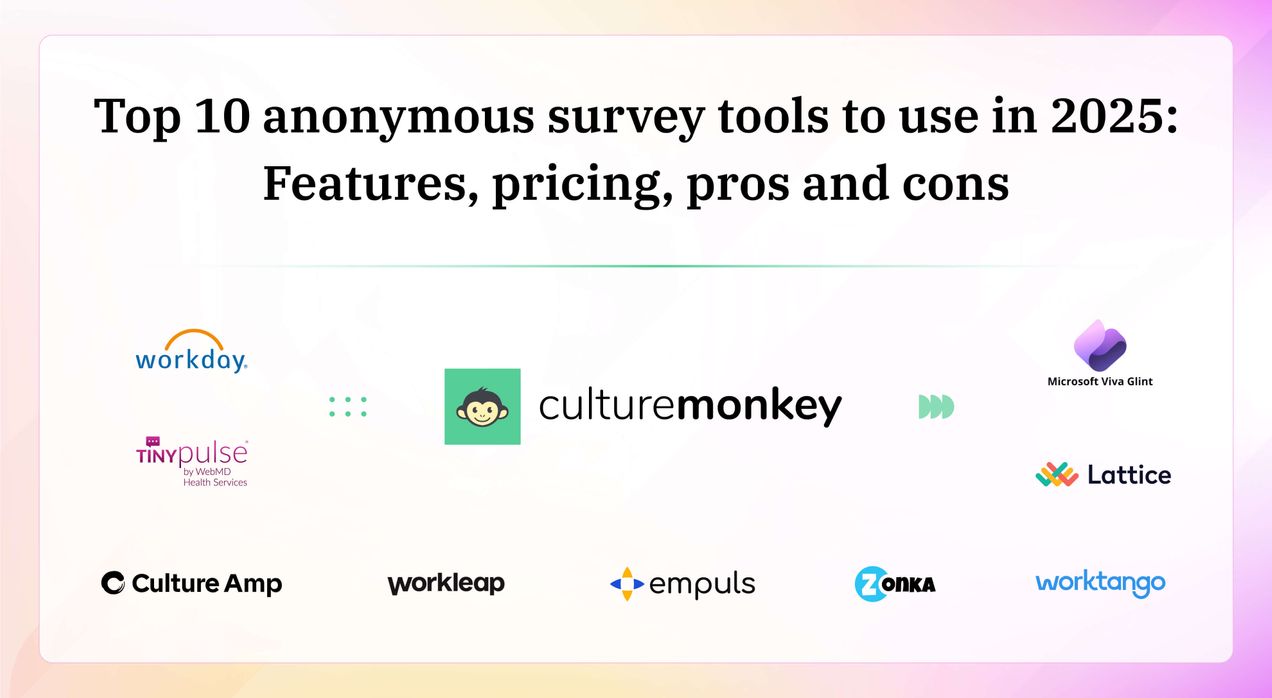5 reasons your organization needs an anonymous employee feedback program

Ever wondered what happens companies skip on implementing anonymous employee feedback programs?
Let’s say a company isn’t ready to make their employee feel heard, do they just make it difficult for employees to submit feedback to leadership? They also send the message that employees have no voice and that leadership doesn't want to hear from their workers. And that's a problem!
But even when companies have feedback programs, they may not use them effectively.
The employee feedback process is vital to improving workplace culture and productivity but needs to be transformed into actionable insights. That's where anonymous feedback comes in. When employees can give feedback without fear of retaliation, they're more likely to be honest and provide feedback insights that can help drive positive change.
Now, let’s dig deeper into why your employee feedback program should be anonymous.
Table of contents:-
- Why should employee feedback be anonymous?
- Anonymity enhances retention, lowers attrition
- Removes the fear of retribution
- Fosters honesty
- Increases feedback participation rates
- Makes employees feel heard
- Should companies have anonymous feedback?
- Pros and cons of anonymous feedback
- How can you gather anonymous feedback?
- Conclusion
Why should employee feedback be anonymous?

The ultimate goal of employee feedback, be it from any survey—pulse survey, manager effectiveness survey, work-life balance survey, employee life cycle survey or even eNPS—is for employers to figure out what’s happening in their workplace and they are on the right track to achieve their goals.
But if not, employee feedback helps employees to speak up about their concerns while also pitching in to developing the company culture. This inturn, helps management to fix things, including work-life balance concerns and safety issues.
To get this done right, companies actively ask for employee feedback to prevent things before they impact negatively.
But what happens when a company doesn’t have a way to collect employee feedback? There are chances that employees' morale will be affected since their issues aren’t being addressed; they might feel disconnected from their company and lose engagement, which will ultimately affect the company’s productivity.
And you wouldn’t want that, right?
Here’s where employee feedback programs come in handy, as they help your employees to voice their concerns, where you can solve their problems and pave the way for increased productivity, and they get to work in an environment where they feel heard. It’s a Win-Win!!
Still, just the employee feedback programs don’t do the trick! Why??
Employees are more likely to hold back on crucial criticism if their identity is being revealed, so here are the 5 reasons why you should implement an anonymous employee feedback program:
Anonymity enhances retention, lowers attrition

As a people leader in your organization, retaining top talent is likely your top priority. One way to enhance retention and lower attrition rates is by implementing anonymous employee feedback programs. But how does anonymity in employee feedback impact retention?
When employees feel comfortable sharing their thoughts and ideas, they are more likely to feel valued and heard. This can lead to increased job satisfaction and employee engagement, ultimately improving retention rates. By implementing anonymous feedback programs, employees can share their honest feedback and opinions without fear of retribution or negative consequences.
Additionally, anonymous feedback can help identify areas for improvement within the organization. By understanding employees' concerns and issues, people leaders can make changes that improve the overall employee experience. This can lead to increased employee loyalty and commitment, further enhancing retention rates.
As Richard Branson once said, "Train people well enough so they can leave, treat them well enough so they don't want to."
By valuing anonymous employee feedback and implementing programs that promote anonymity, organizations can create a culture of open communication and trust that enhances employee retention and ultimately leads to business success.
And by creating an environment where employees feel comfortable sharing their honest opinions, organizations can identify areas for improvement and make changes that enhance the overall employee experience. Organizations can achieve long-term success and growth by valuing and investing in their employees.
Removes the fear of retribution

One of the primary benefits of anonymous employee feedback programs is that they remove the fear of retribution. Employees who feel like their opinions and feedback could result in negative consequences are less likely to speak up and share their thoughts. This can lead to a lack of transparency and communication within the organization, ultimately hindering progress and growth.
By implementing anonymous feedback programs, employees can share their honest opinions without fear of retribution. This can lead to increased employee engagement in feedback processes, ultimately leading to a deeper understanding of the issues within the organization.
Organizations can achieve long-term success and growth by promoting open communication and a culture of learning.
By understanding employees' concerns and issues, leaders can make changes that improve the overall employee experience. This can lead to increased employee loyalty and commitment, further enhancing the organization's success.
Fosters honesty

Anonymous employee feedback programs are a critical factor that fosters honesty in the workplace. When employees know that their feedback is anonymous, they are more likely to share their honest opinions and suggestions, which can lead to positive changes in the organization.
As the famous philosopher Aristotle once said, "Honesty is the first chapter in the book of wisdom."
By fostering a culture of honesty, organizations can gain valuable insights into the experiences and perspectives of their employees, which can help them improve their operations and employee satisfaction.
In addition, anonymous feedback programs can lead to a more diverse range of perspectives being heard. Employees who might not feel comfortable sharing their opinions in a group setting or with their superiors can submit anonymous feedback, providing valuable insights that might not have been shared otherwise. This can lead to a more inclusive and innovative workplace culture.
Increases feedback participation rates

Anonymity in employee feedback programs is a powerful tool that can significantly increase feedback participation rates. When employees feel comfortable and confident that their feedback will remain anonymous, they are more likely to provide candid feedback. This can lead to valuable insights and suggestions that may have otherwise gone unsaid.
One of the primary reasons why anonymity increases survey participation rates is that it removes the fear of retribution. Employees may hesitate to share their feedback if they fear facing negative consequences. Anonymity removes this fear and encourages employees to freely share their thoughts and opinions.
Employees may feel uncomfortable sharing feedback with their superiors or with colleagues who have more power or influence. Anonymity can create a sense of safety and equality, allowing all employees to have an equal voice and an opportunity to share their feedback.
This can lead to valuable insights and suggestions that can help improve the organization and benefit both employees and the organization as a whole
Makes employees feel heard

Anonymity in employee feedback programs is a crucial factor that can make employees feel more comfortable and willing to share their thoughts and opinions. It allows employees to express themselves honestly and candidly, providing managers and HR professionals with valuable insights and feedback they might not otherwise receive.
By making employees feel heard and valued, anonymous feedback programs can help build trust and foster a positive work culture. It can help employees feel that their opinions matter and that the organization is invested in their well-being. This can lead to greater job satisfaction, higher engagement, and increased loyalty to the organization.
Organizations that embrace anonymity in employee feedback programs can benefit from increased participation rates, higher-quality feedback, and a more engaged and productive workforce. Organizations can build stronger relationships with employees and create a positive and supportive work environment by creating a culture of openness and transparency.
Should companies have anonymous feedback?

In today's workplace, companies are placing more emphasis on employee feedback. But the question remains, should feedback be anonymous? There are valid arguments for both sides, but ultimately, there are compelling reasons why companies should have anonymous feedback mechanisms in place.
Anonymous feedback can help reduce bias and discrimination. In many cases, people in positions of power may have biases towards certain individuals or groups, leading to unfair treatment. Anonymous feedback can help minimize these biases by ensuring that feedback is based solely on an employee's work performance and not influenced by personal biases.
Anonymous feedback also promotes transparency and trust. When employees know that their feedback is taken seriously and acted upon, they are more likely to trust their employers and the company as a whole. It can also help create a culture of transparency and open communication, which can be beneficial for overall company performance.
So, yes! Companies should depend on anonymous feedback to gain insights from employee surveys, including yearly employee engagement surveys and real-time anonymous pulse feedback.
Pros and cons of anonymous feedback

While it has more advantages, it also comes with its drawbacks. Let's explore the pros and cons of anonymous feedback.
Pros:
Honest feedback: When employees can give feedback without fear of reprisal, they are more likely, to be honest and forthright in their opinions.
Improved participation: Employees are more likely to participate in feedback programs when their identity is kept anonymous, as they feel more comfortable giving their honest feedback.
Reduced biases: Anonymity helps eliminate biases related to age, gender, race, and job position, which can impact feedback.
Safe space for sensitive topics: Anonymity allows employees to discuss sensitive topics or issues without the fear of being judged or reprimanded.
Encourages open communication: Anonymity eliminates the fear of judgment or repercussions, making employees more comfortable sharing their honest opinions, feedback, and concerns.
Promotes a sense of fairness: Anonymous feedback can help employees feel that their voices are heard without any preferential treatment given to certain individuals or groups.
Provides a safe space: Anonymous feedback can create a safe space where employees can express their concerns without the fear of being criticized or judged.
Encourages innovation: With anonymous surveys, employees can suggest new ideas or ways of doing things without fearing being shot down or ridiculed.
Cons:
Lack of accountability: Anonymous feedback makes it difficult to hold employees accountable for their actions, as their identity is not known.
Misuse of anonymity: Some employees may misuse anonymity to provide feedback that is not constructive criticism or critical feedback or engage in inappropriate behavior.
Limited follow-up: It can be difficult to follow up on anonymous feedback and determine the best course of action.
Lack of context: Anonymity can make it difficult to understand the context of feedback, making it harder to address specific issues.
So, weigh the pros and cons of anonymous feedback and determine if it is the best approach for their organization. It is also essential to have a clear process in place to handle anonymous feedback, ensure it is constructive, and address any concerns that may arise.
How can you gather anonymous feedback?

Collecting anonymous employee feedback is critical to building a positive workplace culture and improving employee satisfaction. With the increasing prevalence of remote work, online anonymous feedback surveys have become an increasingly popular method to gather anonymous employee feedback.
Here are some effective ways to collect anonymous feedback through online surveys:
Keep it short and simple: Employees have limited time and attention spans, so keeping the survey short and straightforward is essential. Focus on asking specific questions that address key areas of concern or interest.
Use a mix of question types: Incorporating various questions, such as multiple-choice, rating scales, and open-ended questions, can provide a more comprehensive view of employees' opinions.
Provide open-ended questions: Along with closed-ended questions, it is also essential to include open-ended questions in the survey to give employees the freedom to express their opinions and share their experiences in their own words.
Ensure anonymity: Reassuring employees that their feedback will remain anonymous is critical. This can be accomplished by using a third-party survey platform that ensures anonymity or by providing anonymous feedback within your company's existing survey platform.
Provide clear instructions: Make sure the survey is easy to navigate, and provide clear instructions on how to complete it. Include a progress bar or indication of how many questions are left to complete to help employees stay engaged.
Follow up on feedback: Once the survey is complete, following up on the feedback is essential. Share the results with employees, and create an action plan to address any concerns or issues raised.
Conclusion
So, yes, it’s necessary for companies to have anonymous employee feedback programs in place to continuously improve and meet their employees' feedback in real-time.
In other words, companies should do nothing but strive to ensure that their employees have the best workplace culture so that they can help the business achieve their goals. But it can also be frustrating to select from hundreds of anonymous employee feedback tools out there.
And this is where an anonymous employee feedback tool like CultureMonkey plays a crucial role. With its unique features, such as AI-powered sentiment analysis, customizable surveys, and real-time reporting, CultureMonkey's anonymous feedback tool can help organizations collect anonymous employee feedback in a hassle-free manner.
Additionally, its user-friendly interface and anonymity options ensure that employees can provide honest feedback without fearing retaliation. By using CultureMonkey, companies can gain valuable insights into employee satisfaction, identify areas for improvement, and take proactive measures to enhance their workplace culture.So be sure to book a demo and check out what else one of the best anonymous feedback tools, i.e. CultureMonkey, can offer to improve your company culture.










